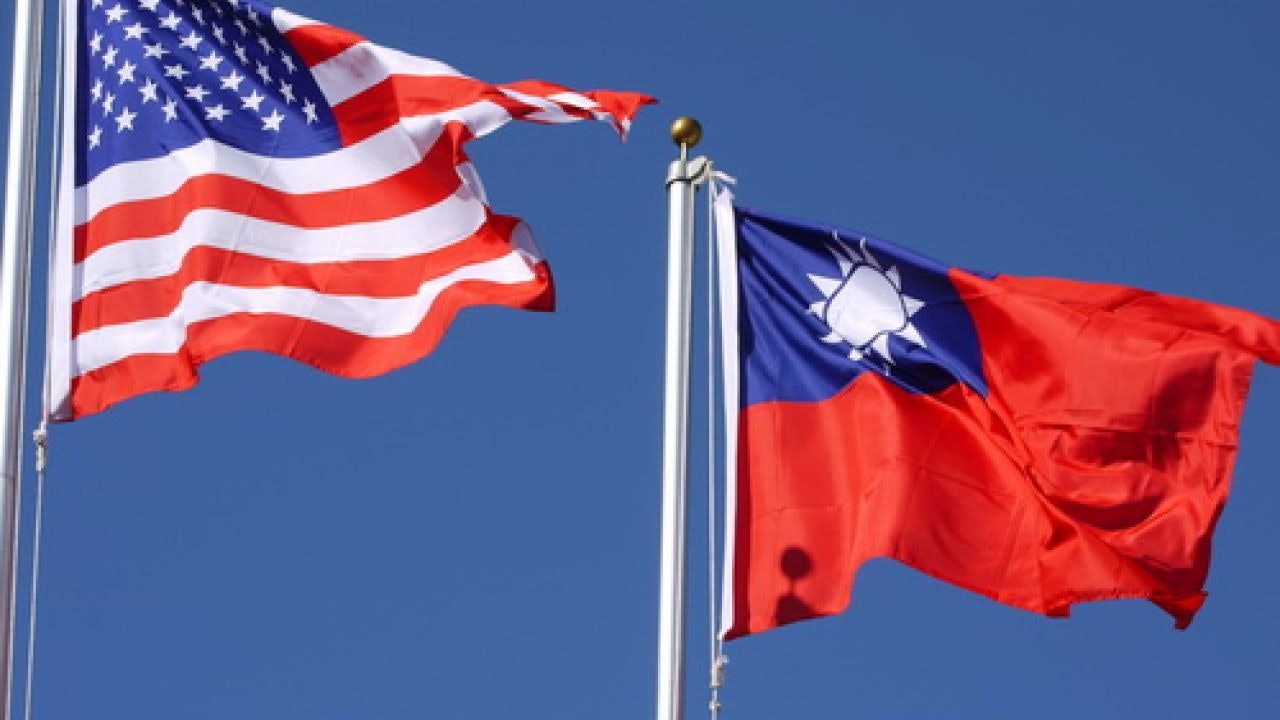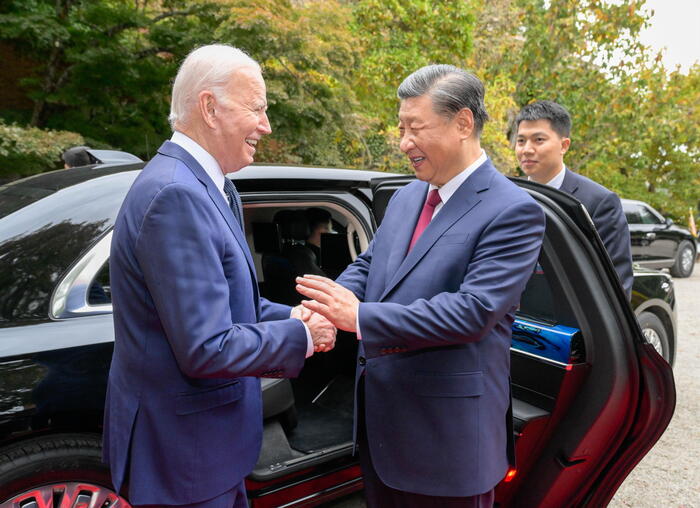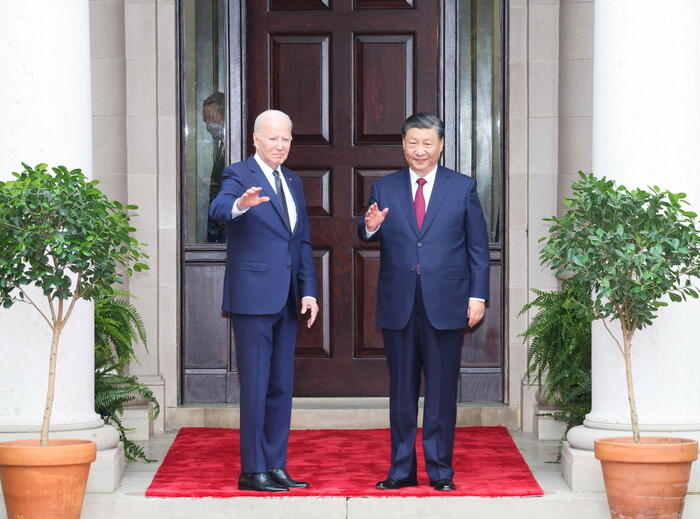The U.S. Senate Foreign Affairs Committee passed the high-profile "Taiwan Policy Act of 2022" on September 14, which the U.S. Congress sees as a comprehensive escalation of Taiwan policy after the "Taiwan Relations Act". Asano Blue and Green expressed their welcome and thanks.
But the relevant treaty is seen as a comprehensive challenge to China's "one-China principle", and Sino-US relations may face a collapse. Beijing has expressed firm opposition.
This "depth bomb" dropped by the United States on China, the United States and the Taiwan Strait, the main points of the bill, the review process, the possible impact, as well as the disputes, doubts and concerns of China, the United States and Taiwan, are fully analyzed in the article "Hong Kong 01".
Who proposed it?
US Senate Foreign Relations Committee Chairman Bob Menendez (Taiwan translated as Menendez) and Republican Senator Graham (Taiwan translated as Graham or Graham) jointly proposed in June, saying that the law is The "most comprehensive adjustment" of U.S. policy toward Taiwan since the Taiwan Relations Act of 1979.
It can be traced back to the Republican Senator Marco Rubio (Marco Rubio), who has a clear "anti-China and pro-Taiwan" stance, fired the first shot in 2020, and the Democratic Senator Jeff Merkley (Jeff Merkley, Merkley proposed the Taiwan Relations Reinforcement Act, hoping to enhance US-Taiwan relations in many aspects such as diplomacy, military affairs, economy, culture and education.
But the law failed to make it to the Senate Foreign Affairs Committee's agenda before the end of the last Congress, and it ended without a hitch.
The sponsors of the "Taiwan Policy Act" are U.S. Senate Foreign Affairs Committee Chairman Menendez (left) and Republican Senator Graham (right).
(Left: Menendez official website; Right: Graham official website)
Menendez and Graham visited Taiwan in April this year (2022). When they met with Tsai Ing-wen at the presidential palace, Graham asked Taiwan to purchase Boeing 787 passenger planes with an amount of up to 8 billion US dollars and returned them. After the United States issued a press release, "I hope Taiwan will announce the purchase of 24 aircraft as soon as possible."
Relevant speeches were "silenced" in the on-site Chinese interpretation and in the press release of the Chinese version of the Presidential Office, which aroused criticism from the Taiwanese media and public opinion. However, at that time, Taiwan's "Ministry of Foreign Affairs" and the National Security Bureau believed that the outside world's doubts were "cognitive warfare."
Seven key points of the bill
1. Diplomacy:
(1) The "Taipei Economic and Cultural Representative Office in the United States" (TECRO) was renamed "Taiwan Representative Office".
(2) The appointment of the director of the Taipei Office of the American Institute in Taiwan (AIT) requires the nomination process of the US ambassador abroad, which must be confirmed and approved by the Senate, and the title should be changed to "Representative".
(3) Emphasize that UN Resolution 2758 does not address the issue of Taiwan's representation, nor does it contain any statement concerning Taiwan's sovereignty.
(4) Require the U.S. Secretary of State to repeal, within 90 days of the Act’s entry into force, the U.S. regulation that does not allow Taiwan to display symbols of sovereignty, including “flags” or military uniforms, within federal agencies.
The "Taiwan Policy Act" will promote the "Taipei Economic and Cultural Representative Office in the United States" to be renamed "Taiwan Representative Office".
(Facebook/Taiwan in the US)
2. Military:
(1) Grant Taiwan the status of "major non-NATO ally" (MNNA).
(2) Create the "Taiwan Security Assistance Initiative" to provide Taiwan with US$4.5 billion in foreign military financing over the next four years.
(3) The "Taiwan Relations Act" will be amended to authorize the sale of more Taiwanese weapons that can help deter the PLA's aggression, and to give priority to Taiwan's arms purchase requests.
(4) Require the United States and Taiwan to establish a comprehensive training plan, including military push and military exercises, so that the United States and Taiwan can develop interoperability, help the two militaries to familiarize themselves with each other, and enhance Taiwan's defense capabilities.
3. Countermeasures/sanctions against Beijing:
(1) The State Council should introduce strategic guidelines and measures to assist Taiwan's public and private sectors in responding to disinformation, cyber attacks, and publicity from China.
(2) Help Taiwan and other allies with similar values to share information and experience through AIT's Global Cooperation and Training Framework.
(3) If the Chinese government escalates its malicious actions against Taiwan on a large scale, and the actions have a significant impact on Taiwan's governance system and territorial integrity, the US president is required to sanction senior Chinese officials, up to the Chinese president.
(4) Sanctions that can be used include freezing assets in the United States, prohibiting entry, and revoking visas.
(5) If any foreign person or organization seriously interferes in Taiwan's democratic process, or aims to destabilize Taiwan, engages in malicious cyber behavior or conducts military exercises that cross the "Taiwan Strait", request the President to impose sanctions.
The "Taiwan Policy Act" will be negotiated on the principle of "asymmetric capabilities" in response to Taiwan's requirements for arms sales to the United States.
(Taiwan Presidential Office)
4. Economy:
(1) Call on the United States and Taiwan to negotiate and sign a bilateral trade agreement (Trade and Investment Framework Agreement, TIFA).
(2) Incorporate Taiwan into the US-led "Indo-Pacific Economic Framework" (IPEF).
5. International participation:
(1) Assist Taiwan in participating in international organizations.
(2) Support Taiwan's participation in the Inter-American Development Bank to further diversify the bank's funding sources.
6. Education:
Require the Secretary of State to establish a "Taiwan Scholars Program" to send U.S. government personnel and other eligible citizens to Taiwan to study Chinese and enter Taiwan's government or private institutions for internships for a maximum of two years.
7. Rules Statement:
Nothing in the Taiwan Policy Act should be construed as a re-establishment of U.S. diplomatic relations with Taiwan or a change in the U.S. government's stance on Taiwan's international status.
Senate Foreign Affairs Committee approves four "fine-tuning"
1. The appointment of the director of the Taipei Office of the American Institute in Taiwan is no longer required to be sent to the Senate for confirmation as the appointment of the US ambassador abroad.
2. The Taipei Economic and Cultural Office was renamed the "Taiwan Representative Office", from a mandatory "requirement" to a suggested "sense of congress".
3. Regarding Taiwan as a "major non-NATO ally", the expression was changed from the original direct "designated" to Taiwan "shall be treated as if it were designated as a major non-NATO ally."
4. Fine-tune some of the sanctions clauses against mainland China, which are less coercive and more flexible for the U.S. government.
The U.S. Senate Foreign Relations Committee passed the Taiwan Policy Act with a 17-5 vote on September 14.
(AP)
Next Steps After Senate Foreign Relations Committee Passage
1. After being passed by the Senate Foreign Affairs Committee, after debate and voting in the chamber, there are three possible outcomes: (1) further revision; (2) sent back to the committee; (3) voted through.
2. After being passed by the Senate, it will be sent to the relevant committee or subcommittee of the House of Representatives for hearing and revision.
The Senate and House of Representatives voted in full, and the content is completely unanimous, and will be sent to President Joe Biden for formal signature.
If the content of a bill exceeds the relevant flexibility, the president may be forced to exercise a veto.
3. The U.S. Congressional midterm elections will be held on November 1, and there are less than four months left in the current Congress.
If the Senate and House of Representatives fail to complete their deliberation before adjournment at the end of November, they can only postpone their deliberation until the new session in early January (2023).
Doubts and concerns within the United States
1. White House:
National Security Adviser Jake Sullivan said he would discuss the draft with Congress and lawmakers, although this bill involving enhanced US security assistance to Taiwan is quite effective and practical, "but some The content also makes us a little worried." White House National Security Council spokesperson Adrienne Watson confirmed that the White House is indeed concerned about some of the provisions, including those that may undermine and contradict the "one China policy."
Former U.S. Deputy Secretary of State Richard Armitage (Taiwan translated as Armitage) wrote an article suggesting that Congress should reconsider some of the provisions of the bill to avoid fueling cross-strait relations, and the United States should focus on substantive assistance to Taiwan rather than symbolic actions.
White House national security adviser Sullivan said on September 7 that he would discuss the bill with members of Congress because of "some provisions that are worrisome."
He was the first senior Biden administration official to speak out during the bill's deliberations.
(AP)
2. Senate Foreign Relations Committee:
Republicans Mitt Romney and Rand Paul questioned that the bill might undermine the US policy of "strategic ambiguity" in the Taiwan Strait, and believed that military aid should be wrapped in a low-key package in the National Defense Authorization Act (NDAA). ) is correct.
Chris Van Hollen, a Democrat, worries that the US may have difficulty raising the military aid budget.
Beijing's official response
1. Qin Gang, Ambassador to the United States:
Taiwanese media "Report" quoted diplomatic sources as saying that when Qin Gang met with U.S. Deputy Secretary of State Wendy Sherman on August 23, he warned in person that if the bill was passed, Sino-U.S. relations would suffer. facing disintegration.
2. Foreign Ministry Spokesperson Mao Ning:
Urges the U.S. side to stop promoting the Taiwan-related bill. "Only by carefully and properly handling Taiwan-related issues can we avoid further damage to China-U.S. relations."
3. Zhu Fenglian, Spokesperson of the Taiwan Affairs Office of the State Council:
The Taiwan issue is purely China's internal affairs. The US congressman's concocted Taiwan-related motion seriously violates the one-China principle. China firmly opposes it. .
Chinese Foreign Ministry spokesman Mao Ning responded to the "Taiwan Policy Act" at a regular press conference on September 14, saying that the United States should abide by the one-China principle and the provisions of the three Sino-US joint communiques, and stop promoting relevant Taiwan-related bills.
Only by carefully and properly handling Taiwan-related issues can we avoid further damage to China-US relations.
(Chinese Foreign Ministry)
The reaction of the government and opposition in Taiwan
1. Xiao Meiqin, representative of Taiwan in the United States:
The US Senate Foreign Affairs Committee "fine-tuned" the bill. Some of it is legislative technology, and some members believe that security issues should now be focused on. The discussion process shows that the United States is concerned about Taiwan's security.
Criticizing Beijing's dissatisfaction, "it seems that something makes them angry every day", but regional peace and stability is beneficial to everyone, including China, and all parties should have a common understanding and work together to maintain regional peace and stability.
Taiwan has repeatedly expressed its commitment to maintaining the status quo, which is conducive to peace and stability.
2. Taiwan's "Ministry of Foreign Affairs":
The US Congress once again demonstrated its cross-party friendly strength and support for Taiwan with concrete actions, and expressed its most sincere thanks to Menendez and Graham for their active leadership in the process.
3. DPP Legislative Yuan Caucus:
I am very happy to see that the Taiwan Policy Act can be advanced to the next level, which will bring substantial progress to Taiwan-US relations.
But now we have only passed the first hurdle. Of course, we hope to continue to move forward and continue to warm up the relationship between Taiwan and the United States.
4. Kuomintang Chairman Zhu Lilun:
We welcome and are happy to see anything that can enhance the substantive relationship between Taiwan and the United States and enhance regional security and peace.
The Foreign Affairs Committee of the US Senate passed the "Taiwan Policy Act", and the Taiwan Presidential Office thanked it for "promoting Taiwan-US cooperative relations in various ways."
The picture shows that on April 15, 2022, Tsai Ing-wen received a delegation from U.S. Senator Menendez, chairman of the Foreign Affairs Committee, at the Presidential Palace.
(Taiwan Presidential Office)
The impact of expert judgment
1. Yang Yongming, former deputy secretary general of the National Security Council of Taiwan:
The "Taiwan Policy Act" is the "Taiwan Substantial Recognition and Proxy War Act", claiming to prevent the recurrence of the Russian-Ukrainian war in Taiwan, but in fact it is to launch and stimulate a war. The proxy war in the Taiwan Strait can even be described as taking over.
2. Guo Zhengliang, a former legislator of the Democratic Progressive Party:
The Act does not promise that the United States will send troops to Taiwan, but it is fully involved in military decision-making, planning, and plan implementation, and even has an annual evaluation. In fact, it is basically a military takeover law. Fang's strategic concept and execution ability are completely distrusted and unconfident.
3. Li Qingping, former deputy secretary-general of the Taiwan SEF:
The United States introduced this bill during the midterm elections, the 20th National Congress of the Communist Party of China, and Taiwan's nine-in-one general election, which is a very dangerous and irresponsible move.
If the status quo is seriously changed in this regard, the Taiwan Strait crisis and military conflict may be in an unpredictable stage.
4. Chen Guoxiang, former chairman of Taiwan Central News Agency:
If the law passes the customs, it will be regarded by the CCP as an invitation to war from the United States. If the United States and Taiwan ignore their concerns accordingly, the CCP will inevitably cross the guardrail of “fight but not broken” between China and the United States. If they go out and fight for their oath of never backing down on sovereign territory, the stability of the Taiwan Strait may be wiped out.
5. Sun Jiarui, a senior media person in Taiwan:
The Act has many flaws or disputes in terms of international law, the division of executive and legislative powers in the United States, or the implementation of the actual foreign policy of the United States in the future.
The granting of Taiwan's "major non-NATO ally" status and the request of the U.S. State Department to coordinate the change of the name of Taiwan's representative office in the United States have reached the bottom line of the executive branch.
6. Zhang Jing, a senior researcher at the Taiwan-China Strategic Society:
This law lists Taiwan as a "major non-NATO ally" of the United States. The real intention is to manipulate symbolism, rather than to improve Taiwan's current arms export and trade relations in accordance with US law. In terms of foreign aid, the substantive treatment that can be obtained from the United States.
Its purpose is to provoke Beijing's emotions, rather than to strengthen substantive relations and deliberately provoke conflict with false tactics, which is absolutely not conducive to regional stability and peace.
7. Weng Lvzhong, Associate Professor of Political Science at Sam Houston State University in Texas, USA:
This Act intends to elevate Taiwan to a state-level ally, which is tantamount to changing the US strategy of "strategic ambiguity" towards Taiwan in the past. Make it clear, specific and nationalized.
"The content of the proposal is very symbolic, but it is also very controversial!"
Is the review of the "Taiwan Policy Act" imminent?
The United States will review the Taiwan Policy Act Sullivan: Some of the provisions make people worry that it will take time for the US Senate Foreign Affairs Committee to pass the "Taiwan Policy Act" and sign it into law. Will the "Taiwan Policy Act" passed the Senate Committee become "Pelosi's visit to Taiwan 2.0"?
The US Senate Foreign Affairs Committee passed the "Taiwan Policy Act" Taiwan Affairs Office of the State Council: the plot will not succeed The United States will review the "Taiwan Policy Act" Former Taiwan Legislator: If the Taiwan Strait is passed, the storm will begin







